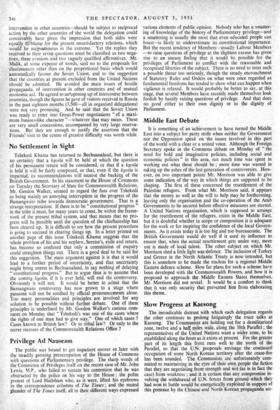Middle East Debate
It is something of an achievement to have turned the Middle East into a subject for party strife when neither the Government nor the Opposition speak on 'the issues involved in this part of the world with a clear or a united voice. Although the Foreign Secretary spoke in the Commons debate on lVfonday of " the need for bold and imaginative policies, including social and economic policies " in this area, not much time was spent in working out what these shouid be ; more time was wasted in raking up the ashes of the last generation of controversies. How- ever, on two important points Mr. Morrison was able to give some indication of the way in which things are supposed to be shaping. The first of these concerned the resettlement of the Palestine refugees. From what Mr. Morrison said, it appears that the money as well as the will to help may be forthcoming, leaving only the organisation and the co-operation of the Arab Governments to be secured before effective measures are started. A United Nations organisation, which is supposed to arrange for the resettlement of the refugees, exists in the Middle East, but it is doubtful whether in scope or composition it is adequate for the work or for inspiring the confidence of the local Govern- ments. As it exists today it is too big and too bureaucratic. The British Government would do well if it used its influence to ensure that, when the actual resettlement gets under way, more use is made of local talent. The other subject on which Mr. Morrison shed a little light was defence. The inclusion of Turkey and Greece in the North Atlantic Treaty is now intended, but this is somehow to be made the nucleus for a regional Middle Eastern defence scheme. How far plans for such a scheme have been developed with the Commonwealth Powers, and how it is proposed to approach the Middle Eastern States themselves, Mr. Morrison did not reveal. It would be a comfort to think that it was only security that prevented him from elaborating this theme.






























 Previous page
Previous page